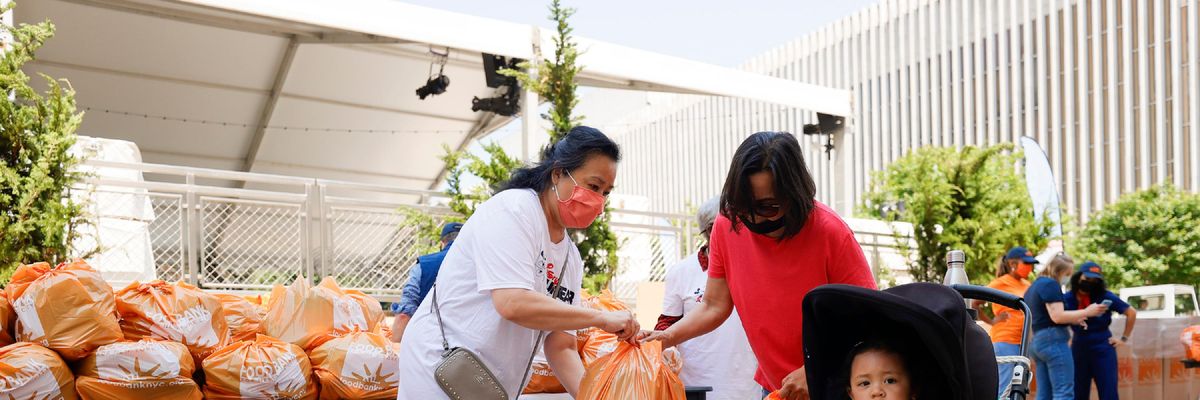
Local residents receive food during a food distribution event in New York City on May 26, 2021. (Photo: Michael Loccisano/Getty Images for Food Bank for New York City)
Corporate Price-Gouging, Lapsed CTC Send US Families to Food Banks in Droves
"My fear, and the fear of many mayors, is that many of our residents are returning to chow lines," said the elected leader of Richmond, Virginia.
As grocery and gas bills surge amid what Sen. Bernie Sanders has called a period of "unprecedented corporate greed" in the United States, where congressional lawmakers have allowed most pandemic relief programs to expire, an increasing number of households are turning to food banks to stave off hunger, the Washington Post reported Monday.
"We want to keep the social safety net intact. It's still necessary as people get back on their feet."
"Make no mistake, people are still struggling. They are struggling in Richmond and all across the country," Levar Stoney, the Democratic mayor of Richmond, Virginia told the newspaper. "My fear, and the fear of many mayors, is that many of our residents are returning to chow lines."
Kyle Waide, president of the Atlanta Community Food Bank, said that "while food distribution to neighbors in need has declined from the peak of the pandemic, the Atlanta Community Food Bank continues to see the need for food assistance considerably higher, as much as 30%, compared to pre-pandemic need."
Radha Muthiah, chief executive of the Washington metro region's Capital Area Food Bank, meanwhile, told the Post that "many of our partners are still seeing higher volumes of individuals coming through their doors, some as many as two or three times their pre-pandemic levels."
Data from the Census Household Pulse Survey shows that rates of reported hunger have been rising for months. In early August, nearly 8% of respondents said their households "sometimes" or "often" didn't have enough to eat. For respondents with children, the figure was almost 9.5%.
By early February--the most recent time period with comparable data--the proportion of those surveyed who said their household sometimes or often lacked a sufficient amount of food jumped to over 10%, including roughly 13% of respondents with children.
During the intervening months, Congress allowed several key Covid-era federal benefits to expire--starting with enhanced unemployment insurance in early September.
A few months later, corporate Democratic Sen. Joe Manchin (W.Va.) joined all 50 Senate Republicans to kill the expanded Child Tax Credit (CTC), even though the measure drastically reduced child poverty last year. In January, the first month since July 2021 that eligible families didn't receive the popular benefit, 3.7 million kids were thrown into poverty.
Related Content

'Morally Obscene': Sanders Blasts GOP, Manchin Over 41% Spike in Child Poverty
Manchin and the GOP's refusal to extend the enhanced CTC benefit beyond the final mid-December payment is making it even harder for millions of families to make ends meet in 2022. In late January and early February, 35% of adults living in households with children said they struggled to cover their usual expenses, according to the Census Bureau.
"We want to keep the social safety net intact," said Stoney, one of several mayors who sent a letter to Congress last week urging lawmakers to prolong the expanded eligibility and increased benefit levels of federal nutrition programs. "It's still necessary as people get back on their feet."
Thomas Mantz, chief executive of Feeding Tampa Bay, part of a national network of 200 food banks, noted that federal aid has disappeared at a particularly fraught economic moment.
"Another concern brewing is that inflation is driving prices up in three key areas," Mantz told the Post. "For many Americans, 30 to 40% of their budget is rent, food, and gas. But for the families we serve, it's more like 60%, so you have families for whom instability is revisiting them significantly now."
As Common Dreams has reported for months, many economic analysts--and a majority of Americans--attribute higher housing, transportation, and food costs to unchecked corporate power, which critics say has enabled big businesses to profiteer amid public health and geopolitical crises.
\u201cSo we\u2019re all going to pretend that large corporations that are raising prices while recording record profits and giving their CEOs raises is called \u201cinflation\u201d now? \n\nI\u2019d call that price-gouging.\u201d— Nina Turner (@Nina Turner) 1647952643
With respect to food, for instance, a handful of mega-chains and meat, egg, and dairy conglomerates have raised prices while cutting frontline worker pay and raking in record profits.
In addition, progressive lawmakers and advocates have denounced highly profitable fossil fuel giants for taking advantage of Russia's war on Ukraine to impose further price hikes at the pump.
A recent poll found that a whopping 80% of people in the U.S. are in favor of imposing a tax on Big Oil's windfall profits, and congressional Democrats have introduced legislation to do so.
However, even as people nationwide are forced to contend with the skyrocketing costs of necessities while being deprived of several hundred dollars in federal income support per month, Post journalist Jeff Stein said on social media that the CTC has "totally disappeared from D.C. discourse."
\u201cThe expanded Child Tax Credit has been dead for almost 3 months now due to Manchin/GOP opposition and as far as I can tell there's no reason to believe that changes. ~4 million kids thrust back into poverty; child poverty rate up ~41% -- totally disappeared from DC discourse\u201d— Jeff Stein (@Jeff Stein) 1647890410
Meanwhile, food banks are also being hammered by higher costs. According to the Post, "A truckload of canned tuna cost $46,000 in February 2020 and is now $57,000, a truckload of peanut butter was about $34,000 and is now $40,000, and a truckload of diced tomatoes was $15,000 and is now $23,000."
"Most food banks say food purchase costs are up, and they're also paying more for transportation and distribution, while reporting labor shortages," noted the newspaper. "Feeding America has asked Congress for more funding to buy food by bumping up money through the Emergency Food Assistance Program."
An Urgent Message From Our Co-Founder
Dear Common Dreams reader, The U.S. is on a fast track to authoritarianism like nothing I've ever seen. Meanwhile, corporate news outlets are utterly capitulating to Trump, twisting their coverage to avoid drawing his ire while lining up to stuff cash in his pockets. That's why I believe that Common Dreams is doing the best and most consequential reporting that we've ever done. Our small but mighty team is a progressive reporting powerhouse, covering the news every day that the corporate media never will. Our mission has always been simple: To inform. To inspire. And to ignite change for the common good. Now here's the key piece that I want all our readers to understand: None of this would be possible without your financial support. That's not just some fundraising cliche. It's the absolute and literal truth. We don't accept corporate advertising and never will. We don't have a paywall because we don't think people should be blocked from critical news based on their ability to pay. Everything we do is funded by the donations of readers like you. Will you donate now to help power the nonprofit, independent reporting of Common Dreams? Thank you for being a vital member of our community. Together, we can keep independent journalism alive when it’s needed most. - Craig Brown, Co-founder |
As grocery and gas bills surge amid what Sen. Bernie Sanders has called a period of "unprecedented corporate greed" in the United States, where congressional lawmakers have allowed most pandemic relief programs to expire, an increasing number of households are turning to food banks to stave off hunger, the Washington Post reported Monday.
"We want to keep the social safety net intact. It's still necessary as people get back on their feet."
"Make no mistake, people are still struggling. They are struggling in Richmond and all across the country," Levar Stoney, the Democratic mayor of Richmond, Virginia told the newspaper. "My fear, and the fear of many mayors, is that many of our residents are returning to chow lines."
Kyle Waide, president of the Atlanta Community Food Bank, said that "while food distribution to neighbors in need has declined from the peak of the pandemic, the Atlanta Community Food Bank continues to see the need for food assistance considerably higher, as much as 30%, compared to pre-pandemic need."
Radha Muthiah, chief executive of the Washington metro region's Capital Area Food Bank, meanwhile, told the Post that "many of our partners are still seeing higher volumes of individuals coming through their doors, some as many as two or three times their pre-pandemic levels."
Data from the Census Household Pulse Survey shows that rates of reported hunger have been rising for months. In early August, nearly 8% of respondents said their households "sometimes" or "often" didn't have enough to eat. For respondents with children, the figure was almost 9.5%.
By early February--the most recent time period with comparable data--the proportion of those surveyed who said their household sometimes or often lacked a sufficient amount of food jumped to over 10%, including roughly 13% of respondents with children.
During the intervening months, Congress allowed several key Covid-era federal benefits to expire--starting with enhanced unemployment insurance in early September.
A few months later, corporate Democratic Sen. Joe Manchin (W.Va.) joined all 50 Senate Republicans to kill the expanded Child Tax Credit (CTC), even though the measure drastically reduced child poverty last year. In January, the first month since July 2021 that eligible families didn't receive the popular benefit, 3.7 million kids were thrown into poverty.
Related Content

'Morally Obscene': Sanders Blasts GOP, Manchin Over 41% Spike in Child Poverty
Manchin and the GOP's refusal to extend the enhanced CTC benefit beyond the final mid-December payment is making it even harder for millions of families to make ends meet in 2022. In late January and early February, 35% of adults living in households with children said they struggled to cover their usual expenses, according to the Census Bureau.
"We want to keep the social safety net intact," said Stoney, one of several mayors who sent a letter to Congress last week urging lawmakers to prolong the expanded eligibility and increased benefit levels of federal nutrition programs. "It's still necessary as people get back on their feet."
Thomas Mantz, chief executive of Feeding Tampa Bay, part of a national network of 200 food banks, noted that federal aid has disappeared at a particularly fraught economic moment.
"Another concern brewing is that inflation is driving prices up in three key areas," Mantz told the Post. "For many Americans, 30 to 40% of their budget is rent, food, and gas. But for the families we serve, it's more like 60%, so you have families for whom instability is revisiting them significantly now."
As Common Dreams has reported for months, many economic analysts--and a majority of Americans--attribute higher housing, transportation, and food costs to unchecked corporate power, which critics say has enabled big businesses to profiteer amid public health and geopolitical crises.
\u201cSo we\u2019re all going to pretend that large corporations that are raising prices while recording record profits and giving their CEOs raises is called \u201cinflation\u201d now? \n\nI\u2019d call that price-gouging.\u201d— Nina Turner (@Nina Turner) 1647952643
With respect to food, for instance, a handful of mega-chains and meat, egg, and dairy conglomerates have raised prices while cutting frontline worker pay and raking in record profits.
In addition, progressive lawmakers and advocates have denounced highly profitable fossil fuel giants for taking advantage of Russia's war on Ukraine to impose further price hikes at the pump.
A recent poll found that a whopping 80% of people in the U.S. are in favor of imposing a tax on Big Oil's windfall profits, and congressional Democrats have introduced legislation to do so.
However, even as people nationwide are forced to contend with the skyrocketing costs of necessities while being deprived of several hundred dollars in federal income support per month, Post journalist Jeff Stein said on social media that the CTC has "totally disappeared from D.C. discourse."
\u201cThe expanded Child Tax Credit has been dead for almost 3 months now due to Manchin/GOP opposition and as far as I can tell there's no reason to believe that changes. ~4 million kids thrust back into poverty; child poverty rate up ~41% -- totally disappeared from DC discourse\u201d— Jeff Stein (@Jeff Stein) 1647890410
Meanwhile, food banks are also being hammered by higher costs. According to the Post, "A truckload of canned tuna cost $46,000 in February 2020 and is now $57,000, a truckload of peanut butter was about $34,000 and is now $40,000, and a truckload of diced tomatoes was $15,000 and is now $23,000."
"Most food banks say food purchase costs are up, and they're also paying more for transportation and distribution, while reporting labor shortages," noted the newspaper. "Feeding America has asked Congress for more funding to buy food by bumping up money through the Emergency Food Assistance Program."
As grocery and gas bills surge amid what Sen. Bernie Sanders has called a period of "unprecedented corporate greed" in the United States, where congressional lawmakers have allowed most pandemic relief programs to expire, an increasing number of households are turning to food banks to stave off hunger, the Washington Post reported Monday.
"We want to keep the social safety net intact. It's still necessary as people get back on their feet."
"Make no mistake, people are still struggling. They are struggling in Richmond and all across the country," Levar Stoney, the Democratic mayor of Richmond, Virginia told the newspaper. "My fear, and the fear of many mayors, is that many of our residents are returning to chow lines."
Kyle Waide, president of the Atlanta Community Food Bank, said that "while food distribution to neighbors in need has declined from the peak of the pandemic, the Atlanta Community Food Bank continues to see the need for food assistance considerably higher, as much as 30%, compared to pre-pandemic need."
Radha Muthiah, chief executive of the Washington metro region's Capital Area Food Bank, meanwhile, told the Post that "many of our partners are still seeing higher volumes of individuals coming through their doors, some as many as two or three times their pre-pandemic levels."
Data from the Census Household Pulse Survey shows that rates of reported hunger have been rising for months. In early August, nearly 8% of respondents said their households "sometimes" or "often" didn't have enough to eat. For respondents with children, the figure was almost 9.5%.
By early February--the most recent time period with comparable data--the proportion of those surveyed who said their household sometimes or often lacked a sufficient amount of food jumped to over 10%, including roughly 13% of respondents with children.
During the intervening months, Congress allowed several key Covid-era federal benefits to expire--starting with enhanced unemployment insurance in early September.
A few months later, corporate Democratic Sen. Joe Manchin (W.Va.) joined all 50 Senate Republicans to kill the expanded Child Tax Credit (CTC), even though the measure drastically reduced child poverty last year. In January, the first month since July 2021 that eligible families didn't receive the popular benefit, 3.7 million kids were thrown into poverty.
Related Content

'Morally Obscene': Sanders Blasts GOP, Manchin Over 41% Spike in Child Poverty
Manchin and the GOP's refusal to extend the enhanced CTC benefit beyond the final mid-December payment is making it even harder for millions of families to make ends meet in 2022. In late January and early February, 35% of adults living in households with children said they struggled to cover their usual expenses, according to the Census Bureau.
"We want to keep the social safety net intact," said Stoney, one of several mayors who sent a letter to Congress last week urging lawmakers to prolong the expanded eligibility and increased benefit levels of federal nutrition programs. "It's still necessary as people get back on their feet."
Thomas Mantz, chief executive of Feeding Tampa Bay, part of a national network of 200 food banks, noted that federal aid has disappeared at a particularly fraught economic moment.
"Another concern brewing is that inflation is driving prices up in three key areas," Mantz told the Post. "For many Americans, 30 to 40% of their budget is rent, food, and gas. But for the families we serve, it's more like 60%, so you have families for whom instability is revisiting them significantly now."
As Common Dreams has reported for months, many economic analysts--and a majority of Americans--attribute higher housing, transportation, and food costs to unchecked corporate power, which critics say has enabled big businesses to profiteer amid public health and geopolitical crises.
\u201cSo we\u2019re all going to pretend that large corporations that are raising prices while recording record profits and giving their CEOs raises is called \u201cinflation\u201d now? \n\nI\u2019d call that price-gouging.\u201d— Nina Turner (@Nina Turner) 1647952643
With respect to food, for instance, a handful of mega-chains and meat, egg, and dairy conglomerates have raised prices while cutting frontline worker pay and raking in record profits.
In addition, progressive lawmakers and advocates have denounced highly profitable fossil fuel giants for taking advantage of Russia's war on Ukraine to impose further price hikes at the pump.
A recent poll found that a whopping 80% of people in the U.S. are in favor of imposing a tax on Big Oil's windfall profits, and congressional Democrats have introduced legislation to do so.
However, even as people nationwide are forced to contend with the skyrocketing costs of necessities while being deprived of several hundred dollars in federal income support per month, Post journalist Jeff Stein said on social media that the CTC has "totally disappeared from D.C. discourse."
\u201cThe expanded Child Tax Credit has been dead for almost 3 months now due to Manchin/GOP opposition and as far as I can tell there's no reason to believe that changes. ~4 million kids thrust back into poverty; child poverty rate up ~41% -- totally disappeared from DC discourse\u201d— Jeff Stein (@Jeff Stein) 1647890410
Meanwhile, food banks are also being hammered by higher costs. According to the Post, "A truckload of canned tuna cost $46,000 in February 2020 and is now $57,000, a truckload of peanut butter was about $34,000 and is now $40,000, and a truckload of diced tomatoes was $15,000 and is now $23,000."
"Most food banks say food purchase costs are up, and they're also paying more for transportation and distribution, while reporting labor shortages," noted the newspaper. "Feeding America has asked Congress for more funding to buy food by bumping up money through the Emergency Food Assistance Program."

